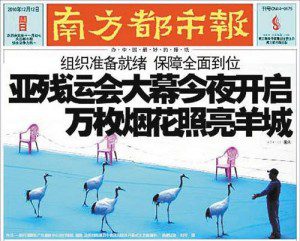China’s Ministry of Truth
The Ministry of Truth is an Orwellian notion. But in China directives dictating what newspapers can and cannot write about actually exist. China Digital Times (CDT), an excellent online publication co-ordinated by Xiao Qiang, director of the China Internet Project at UC Berkeley, California collects directives and publishes them on a weekly basis, under the title of the Ministry of Truth directives. The censorship directives aren’t widely available, Xiao’s sources vary, but they include twitter accounts and blogs. The CDT translate the instructions and check “them against official Chinese media reports to confirm their implementation.”
 A directive published by CDT on 12 December makes clear that after the Nobel Peace Prize ceremony on 10 December, the Ministry of Truth pointedly told newspapers not to report on the Chinese winner of the nobel peace prize dissident Liu Xiaobo. As usual some Chinese citizens and journalists found a way to covertly talk about the issue, one newspaper front page — the groundbreaking Southern Metropolis Daily — broke this rule. The chairs on the cover, which were for a story on the opening of the Asian Para Games, were widely interpreted as representing Liu’s empty chair at the Nobel ceremony, with the cranes apparently indicating a tribute to the empty chair.
A directive published by CDT on 12 December makes clear that after the Nobel Peace Prize ceremony on 10 December, the Ministry of Truth pointedly told newspapers not to report on the Chinese winner of the nobel peace prize dissident Liu Xiaobo. As usual some Chinese citizens and journalists found a way to covertly talk about the issue, one newspaper front page — the groundbreaking Southern Metropolis Daily — broke this rule. The chairs on the cover, which were for a story on the opening of the Asian Para Games, were widely interpreted as representing Liu’s empty chair at the Nobel ceremony, with the cranes apparently indicating a tribute to the empty chair.
One of the comments from netizens, translated by CDT, was:
qqxk 缱绻星空: Congratulating the empty chair??? This is fatalistic. I love Southern Metropolis Daily. Very talented. But I am extremely worried how long [the paper] will last?!!
Other Chinese citzens celebrated the award via the Sina microblog, the hottest new social media in China, which is often used to publish fresh information and celebrate censored events. In the weekend that followed the ceremony, people began to publish descriptions of people they admired, people who just happened to have the surname Liu. Cooincidently these Liu’s seemed to share many attributes with Liu Xiaobo, they had “won many awards” the were also “unjustly accused and spent many years in prison.” The ultimate name, though, would be a celebrated actor, political figure or sportsman. Examples that were wildly circulated were translated by China blog Danwei’s Joel Martinsen:
From @VicCh:
Essay: The person I admire most — “The person I most admire has the surname Liu. He has won major international prizes, and his deeds have inspired a fighting spirit in his countrymen. Although for a time he vanished from our sight, I believe his spirit will live on….” The teacher moves to call the police. The next line: “His name is Liu Xiang (刘翔).”From @doubleaf (陈双叶) via @songshinan (宋石男):
The person I most admire has the surname Liu. He led students campaigns, published books, and won international prizes. Later he was unjustly accused and spent many years in prison. But I believe that all of this is but the test of history, because he said that fortunately, history is written by the people. His name is Liu Shaoqi (刘少奇).
There have been few other ways of celebrating or reacting to the ceremony this month, either on the internet or in state media. iZaobao, a well-known (and blocked) news analysis blog, mentioned only the “award ceremony in Oslo”, and not to the person or prize by name. Liu Xia, Liu Xiaobo’s wife, is still under close surveillance and had her telephone line was cut on the day of the ceremony. Those who feel the confinement unnecessary so long after the event have condemned this act. Members of Liu’s family are also still prevented from visiting him in prison.
